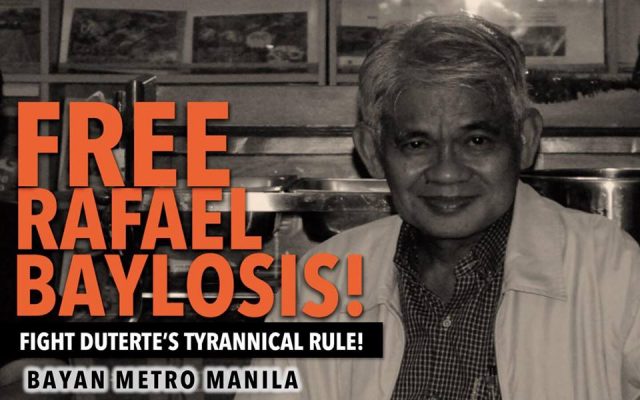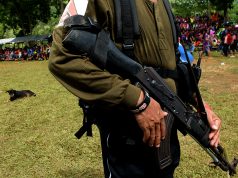Edre Olalia is president of the National Union of Peoples’ Lawyers and convenor of the International Legal Advisory Team
Rafael Baylosis is a publicly known political consultant of the NDFP (National Democratic Front of the Philippines) since 1995. He is presently an active member of its Reciprocal Working Group on Political and Constitutional Reforms. Part of its continuing work is to study the issue of federalism and its particular impact on such reforms and the overall peace process.
As a participant in the peace process, Baylosis is covered by the 1995 GRP (Government of the Republic of the Philippine)-NDFP Joint Agreement on Safety and Immunity Guarantees.
Contrary to the claim of the police, he and his companion were simply not in possession of any firearm when they were seized by GRP operatives. Both do not have any outstanding warrant against them.
The routinary planting of evidence was casually employed to provide the ground for the arrest where there was none.
By manufacturing evidence to justify his illegal arrest on top of already existing false charges against him, the GRP is circumventing and contravening the protection of his rights and immunities under the JASIG.
Also, by penalizing political advocacy through the filing of criminal charges, trumped-up at that, this violated, among many other rights, the explicit prohibition against such practice stipulated in the 1998 GRP-NDFP Comprehensive Agreement on Respect for Human Rights and International Humanitarian Law.
Both JASIG and CARHRIHL subsist and have not been rescinded or made ineffective and are, therefore, binding agreements between the Parties, i.e, both the GRP and the NDFP.
The JASIG was forged by the Parties in anticipation of situations just as what is presently happening. It was designed and intended to grant safety and immunity guarantees to “protect the rights” and encourage participation of individuals from both sides without any negative consequence for such involvement in the peace negotiations.
Thus the primary purposes of the guarantees are 1) “to facilitate the peace negotiations,” 2) “create a favorable atmosphere conducive to free discussion and movement,” and 3) “avert any incident that may jeopardize the peace negotiations.”
The JASIG was adopted by the Parties to protect their respective “negotiators, consultants, staffers, security and other personnel” who participate or have participated in the peace negotiations.
The safety guarantees refer to “free and unhindered passage” all over the country and even in traveling in and out in connection with their roles in the peace negotiations.
These safety guarantees logically cease to be available when the peace negotiations are properly terminated.
The immunity guarantees mean freedom from “surveillance, harassment, search, arrest, detention, prosecution and interrogation or any other similar punitive actions due to any involvement or participation in the peace negotiations.”
Unlike the safety guarantees, the immunity guarantees mentioned shall, rightfully, “remain in full force and effect even after the termination” of the JASIG, and consequently, the termination of the peace negotiations itself.
In other words, if there is no JASIG, the peace negotiations cannot proceed freely and properly as those involved in the process are risking the opposite of what its safety and immunity provisions guarantee.
But if the peace negotiations, and the JASIG, are properly terminated, then the safety guarantees mentioned cease but the immunity guarantees remain and are perpetual.
Because the immunity is perpetual, it cannot be undermined, withdrawn, revoked or violated by any Party even after the JASIG or the peace negotiations are terminated.
And this is even so if they are not properly terminated by the agreed upon process, namely: 1) a written notice is given by one Party to the other 2) addressed to the latter’s proper entity 3) and duly receipted or acknowledged.
If the said protocol is faithfully followed, then and only then will the JASIG be “deemed terminated 30 days after receipt of the notice of termination.”
This simple but indispensable procedure was intended to protect everyone involved in the process and to avoid secrecy, surprises, or sabotage and possibly to give ample time for the Parties to reconsider.
But in such an eventuality, only the safety guarantees of free and unhindered passage and travel cease but the immunity guarantees continue to apply.
Since the procedure for terminating the JASIG or the peace negotiations was only through a unilateral public proclamation or persistent announcement by the GRP principal, then not only are the peace negotiations not yet properly terminated, but all the immunity and even safety guarantees subsist and can be justly invoked.
Certainly, even with the GRP’s Proclamation 360 terminating the talks as far as it is concerned, the Parties are still obliged to respect and continue their common and separate duties and responsibilities under the CARHRIHL.
When parties to a solemn agreement mutually lay out in explicit terms the specific manner and procedure to observe precisely in addressing a contingency in the future, this must be honored.
Hence, when an agreement clearly and expressly provides the specific mode of procedure, this cannot be set aside and a unilateral claim made that it has been satisfied by mere implication, no matter how evident it may be.
Since the JASIG is a bilateral solemn agreement binding on both the GRP and NDFP, their respective legal and judicial processes and executive policy are subject to the commitments they made to grant the safety and immunity guarantees to the other. This is in fact to the mutual interest of both Parties.
Hence, the filing or pendency in the GRP courts of cases against a negotiator or consultant of the NDFP — false and trumped-up at that- or the surveillance, harassment, arrest etc. or any punitive action made, are effectively a circumvention if not open violation of the JASIG’s safety and immunity guarantees. This should be a legal and political ground for immediate release in addition to CARHRIHL.
In the same way, because of the JASIG, the NDFP is bound to respect and follow the said safety and immunity guarantees of the GRP’s “negotiators, consultants, staffers, security and other personnel” who participate or have participated in the peace negotiations.
Therefore, the “no talks, no immunity” line of the GRP, the claim that “JASIG has no value because there are no more peace talks,” or that the filing of charges or pendency of cases in the GRP courts against an NDFP consultant like Baylosis is erroneous, deceptive and self-serving.
In sum, the bilateral agreements like the JASIG, which were drafted, negotiated, adopted and applied by both Parties, remain binding and subsist. It should outlive and outlast those who refuse to honor its binding effect.









